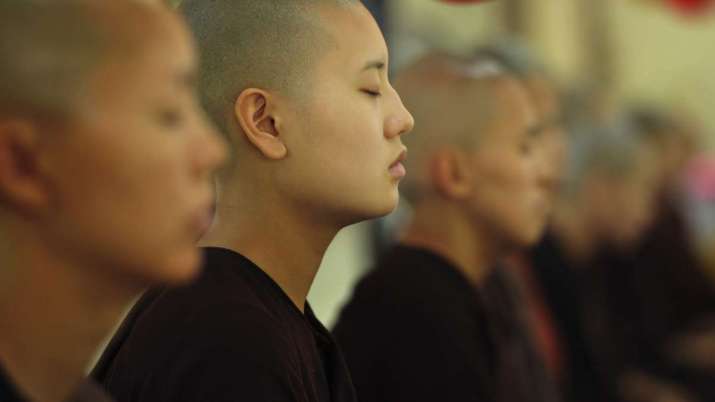FEATURES|COLUMNS|Theravada Teachings
Some Observations on the Subject of Meditation

Before we even take our first in-breath in Buddhist meditation, there are some things we should understand before we can proceed to Right Concentration upon the path.
Without a firm foundation in morality and mindfulness, we will continue to fall victim to wrong views and delusions in ways that will invariably hinder our progress on the path toward the incremental development of wisdom. If the body and the mind are not properly developed on the path, it will be impossible for us to advance to a level of wisdom and purity, no matter how much breathing meditation we may try to do.
In the Buddhadhamma, the path is very clearly divided into sila (Pali. morality), sati (concentration), and panna (wisdom). There are no shortcuts in the process. There is no jumping over stages or leaving out any of the steps which must develop and intertwine, as when strong rope or cord is tightly wound and twisted, so that it will hold firm and secure when it is severely tried and tested.
Many of us become confused concerning meditation because we have heard about the destination but are just not ready to make the necessary steps in the process of development which, if resolutely continued, will take us to the desired end. We may easily lose focus and become impatient before we reach the goal, and then give up in desperation, unconsciously allowing the mind run back to worldly concerns and to again begin chasing conditioned, mundane things.
While this may occur due to development of personal wrong views and delusions, wrong understanding can also be corrected with the help of a good teacher, if the would-be meditator is well guided and turns impatience and ignorance into humility and the skill or ability to follow wise counsel.
Before continuing, we should note that not all methods of meditation are Buddhist by nature. Meditation may be practiced in diverse ways for different peoples and purposes. A few random examples might be: the warrior who calms his mind to focus on the kill; the manager who is stressed and cannot maintain equanimity in face of fierce competition; or the ascetic who is meditating to reach ecstatic heights by transcending to and vibrating in the outmost bounds of the cosmos.
Meditation was not originally a Buddhist practice. In fact, it existed and was practiced in India even before the Buddha’s time. Before his Supreme Enlightenment, the Buddha had already become an advanced yogi at the level of neither perception nor non-perception, yet, despite this achievement, he was still not satisfied that he had reached the ultimate end of his pursuit, so he went off on his own, leaving his ascetic teacher in order to continue seeking the root cause of suffering—a quest he had not yet finished, based on a question that he had not yet been able to answer.
What makes Buddhist meditation unique is that it uncovers and eradicates the root source of suffering, which no ascetic before the time of the Buddha had uncovered and discovered for himself. The Buddha's method of meditation involves “the mind watching the mind,” in order to be able to seek out and eradicate the cause of suffering as it arises within the thought process.
It should be stressed that in Buddhist meditation, following the Noble Eightfold Path, there can be no enlightenment without sila and sati working in balance and harmony. To be candid, we must understand that—due to the flux and confusion of the mundane world—such harmony and balance can only be achieved by arousing mindfulness, followed by ardent effort, persevering with endurance to attain a meditative state of one-pointed concentration. This does not sound easy but it can be done.
The mind watching the mind may be compared to a scavenger hunt. The mind, when so meditating may be said to be blessed, because every step it takes in the right direction is a step in the process of mental purification. Every moment of discernment of what is wholesome and what is unwholesome is an increment in development of a power of mind that leads to wisdom and an understanding of ultimate reality.

Meditation has also been compared to a baby leaning to walk. When we are taking our first step as we learn to walk, we are not yet able to see the end of the journey, but with each step we come closer to our goal. So if we continue walking, each step will take us nearer to the final destination.
If we combine the two above analogies, we may say that as we are walking we can see, pick up, and discard trash and other unwholesome objects and continue eradicating and getting rid of them as we make our way along the path. We may find the steps on the journey to be unpleasant and painful, but as we keep discarding unwholesome elements as they appear within our minds, the more we persevere—with determination and effort—the more we will be able to eradicate impure mental elements from our minds and replace them with their wholesome opposites.
The irony of such practice is that we treat ourselves both harshly and gently, in alternating sequence, and the good news is that the more we continue to endure and persevere, the less harsh we have to be on ourselves and the more gently we may treat ourselves. With time and effort, there will be fewer and fewer impurities in the mind. With time, there will be less and less cause for blame and shame to hinder mental development.
First, we begin walking. And as we continue along the path, increasing our efforts, dependent upon mindfulness, energy, and endurance, we see how we are developing a mental culture on the path of purity, which is more satisfying than the worldly, mundane way we viewed things in the past, and we would not want to return there anymore.
We begin with sila; we develop sati, and using mindful attentiveness, we continue detaching ourselves from the worldly world and thereby come to understand how we may proceed toward the final destination, as the mind is gradually and incrementally purified of all and any residues of unwholesome elements.
Related features from Buddhistdoor Global
From Mindfulness to Right Mindfulness: Pāli Buddhist Thought
McMindfulness, or Knowing What Really Matters: A Fresh Take on Loving-kindness Practice
Metta’s Higher Fives














